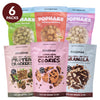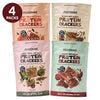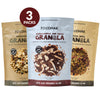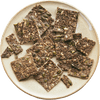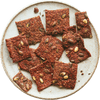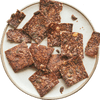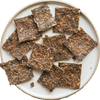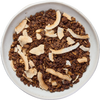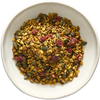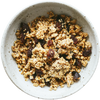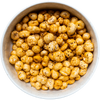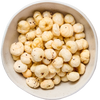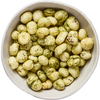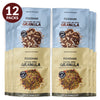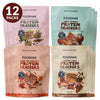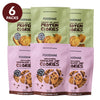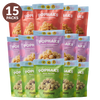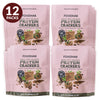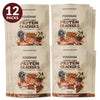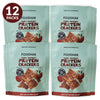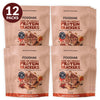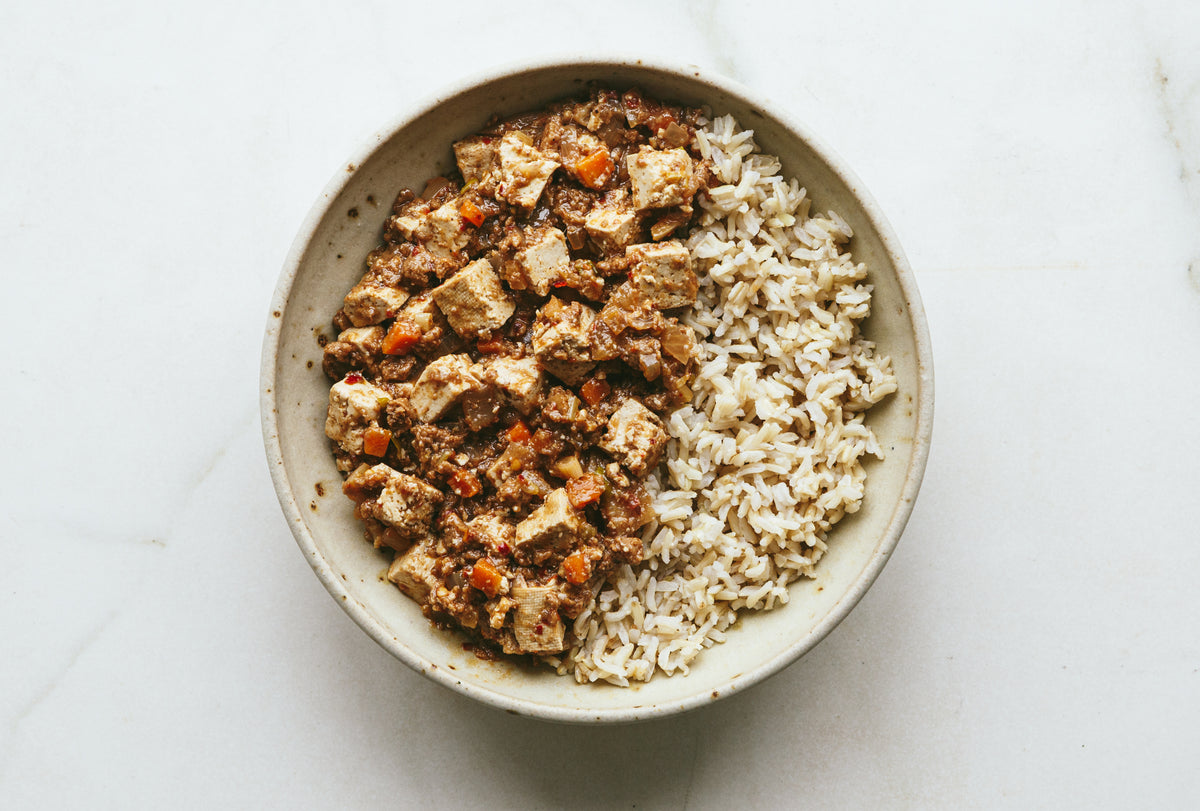
Best Protein Sources for Vegans and Vegetarians
A common concern about vegan protein is that it's insufficient, but a well-planned plant-based diet can provide all essential amino acids, with sources like beans, lentils, and tofu offering ample protein.
Vegan protein offers numerous health benefits. Plant-based sources, such as legumes and tofu, provide essential amino acids crucial for muscle health. These proteins aid in muscle development and repair, supporting overall fitness. Moreover, incorporating vegan protein into the diet contributes to weight management due to lower calorie and saturated fat content, along with the appetite-suppressing effects of fiber. Research also suggests that plant-based diets may reduce the risk of cardiovascular diseases, emphasizing the positive impact of vegan protein on heart health. Overall, these findings highlight the holistic advantages of embracing plant-based protein sources.
High vegan protein intake may pose risks of nutrient deficiencies like B12 and minerals, and some may experience digestive issues with certain plant-based sources, emphasizing the importance of a well-balanced diet and professional guidance.
Seitan, a popular meat substitute in vegan diets, is made from wheat gluten and water, resulting in a high-protein, low-carb product. With approximately 21 grams of protein per 3-ounce serving, seitan is a valuable source of plant-based protein. It lacks some essential nutrients found in whole grains, but it contributes to muscle health and weight management due to its protein content. Seitan is versatile, commonly used in dishes like stir-fries, sandwiches, and stews, offering a chewy texture reminiscent of meat. While it's a valuable protein source, individuals with gluten sensitivities should avoid it, as it is gluten-rich by nature.
Tofu, tempeh, and edamame are versatile plant-based foods. Tofu, made from soybean curds, is protein-rich, offering around 10 grams per half cup. It's low in calories and a good source of iron and calcium, supporting muscle and bone health. Tempeh, a fermented soy product, is nutrient-dense with a firmer texture and a higher protein content of about 15 grams per half cup. Rich in probiotics, tempeh aids digestion. Edamame, young soybeans, provides 17 grams of protein per cup, along with fiber and essential vitamins. These ingredients are widely used in dishes like stir-fries, salads, and plant-based protein alternatives.
Lentils, a versatile legume, are a superb source of plant-based protein, with approximately 25% protein content. Varied dishes, from soups to curries, showcase the adaptability of lentils, complementing diverse culinary traditions globally. Common types include green, brown, red, and black lentils, each with unique textures and flavors. Beyond protein, lentils boast a rich nutritional profile, offering fiber, iron, folate, and essential vitamins. Their low fat content promotes heart health, while the abundance of complex carbohydrates provides sustained energy. Incorporating lentils into diets contributes to overall well-being, making them an indispensable component in wholesome and nutritious meals.
Nutritional yeast is a versatile, deactivated yeast often used as a flavor-enhancing ingredient in vegetarian and vegan dishes. It imparts a savory, cheese-like taste and is a complete protein, containing all nine essential amino acids. Typically, it boasts about 40% protein by weight. Commonly used in vegan cuisine, nutritional yeast elevates the flavor of dishes like pasta, soups, and snacks.
There are different types of nutritional yeast, including fortified varieties enriched with B-vitamins like B12, making it a valuable supplement for those on plant-based diets. The nutritional benefits include being a low-calorie, low-fat source of protein, fiber, and essential nutrients. However, some individuals may be allergic to yeast, and excessive consumption might lead to digestive discomfort. Its special features lie in its ability to mimic the taste of cheese, making it a popular ingredient for those seeking dairy-free alternatives in their culinary creations.
Spelt and teff are ancient grains cherished for their nutritional value and culinary versatility. Spelt, a variety of wheat, contains approximately 15% protein, making it a valuable protein source. Teff, a gluten-free grain originating from Ethiopia, is rich in protein, with around 37% content. Both grains lend themselves to diverse dishes, with spelt commonly used in bread, pasta, and salads, while teff is a key ingredient in injera, a traditional Ethiopian flatbread.
Spelt comes in different forms, including whole spelt berries, spelt flour, and spelt flakes. Teff, too, has various varieties such as ivory and brown teff. Nutritionally, these grains offer dietary fiber, vitamins, and minerals, promoting digestive health and providing sustained energy. However, individuals with gluten sensitivity should exercise caution. Special features of spelt and teff lie in their ancient origins, nutritional richness, and adaptability to a variety of culinary applications, making them prized choices for those seeking wholesome and diverse grains.
Hemp seeds, derived from the Cannabis sativa plant, are a nutritious and versatile superfood. They contain about 25% protein by weight, making them an excellent plant-based protein source. Hemp seeds have a mild, nutty flavor and are used in a variety of dishes, including salads, smoothies, and granola. There are different types of hemp seeds, such as hulled hemp seeds (hemp hearts), hemp seed oil, and whole hemp seeds.
Nutritionally, hemp seeds offer a range of benefits. They are rich in omega-3 and omega-6 fatty acids, providing a healthy balance, and are a good source of vitamins and minerals, including iron and magnesium. Hemp seeds also contain fiber, supporting digestive health. On the downside, hemp seeds are relatively high in calories, and some people may be allergic to them. Their special features include being a complete protein and containing compounds like gamma-linolenic acid (GLA), contributing to their health-promoting properties.
Amaranth and quinoa are ancient grains celebrated for their nutritional density and culinary adaptability. Amaranth, a gluten-free grain, contains around 9 grams of protein per cooked cup, while quinoa, a complete protein, provides about 8 grams per cooked cup. Both grains are featured in a variety of dishes; amaranth is commonly used in porridge, salads, and baked goods, while quinoa is prevalent in salads, bowls, and as a rice substitute.
Amaranth comes in various types, including red, green, and white, each with distinct flavors and textures. Quinoa, on the other hand, has three primary varieties: white, red, and black, each offering a unique nutty taste. Nutritionally, both grains are rich in fiber, vitamins, and minerals, providing sustained energy and supporting digestion. However, some people may need to be cautious of anti-nutrients present in both grains, and cooking methods can mitigate their effects. Their special features lie in being gluten-free, versatile, and nutrient-packed, making them valuable components of a well-rounded diet.
Ezekiel bread is a type of bread crafted from organic, sprouted whole grains and legumes, inspired by a biblical recipe. It typically includes ingredients like sprouted wheat, barley, lentils, soybeans, and spelt. The sprouting process is believed to enhance nutrient absorption. Ezekiel bread contains around 8 grams of protein per ounce, making it a protein-rich alternative to traditional bread.
Dishes made with Ezekiel bread include sandwiches, toasts, and French toast, providing a wholesome and nutrient-dense base. Different types of Ezekiel bread variations may include sesame, flaxseed, or cinnamon raisin varieties, adding diversity to its nutritional profile.
Nutritional benefits of Ezekiel bread include a good source of fiber, vitamins, and minerals, along with increased digestibility due to the sprouting process. However, some individuals may find it an acquired taste, and its denser texture may differ from conventional bread. Ezekiel bread's special features lie in its unique blend of sprouted grains and legumes, offering a distinct flavor and potential health benefits.
Soy milk is a plant-based milk alternative made from soybeans. It serves as a popular dairy-free option, particularly for individuals with lactose intolerance or those following a vegan diet. On average, soy milk contains around 3.5 grams of protein per 4-ounce (half cup) serving.
Soy milk is a versatile ingredient, widely used in both sweet and savory dishes. It's commonly found in smoothies, coffee, cereals, and used in baking and cooking to replace dairy milk.
There are various types of soy milk available, including sweetened, unsweetened, vanilla-flavored, and chocolate-flavored options. Nutritional benefits of soy milk include being a rich source of protein, essential fatty acids, vitamins, and minerals. It is often fortified with nutrients like calcium and vitamin D. However, some people may be allergic to soy, and there are concerns about its potential for hormonal effects due to the presence of phytoestrogens. Special features include its creamy texture and ability to serve as a one-to-one replacement for cow's milk in many recipes.
Oats are a nutritious whole grain known for their versatility and health benefits. They are a rich source of dietary fiber, vitamins, and minerals. In terms of protein content, oats provide approximately 2 grams of protein per ounce. Commonly used in breakfast dishes like oatmeal, granola, and overnight oats, they offer a satisfying and heart-healthy meal.
There are various types of oats, including old-fashioned oats, steel-cut oats, and instant oats, each with different textures and cooking times. The nutritional benefits of oats include promoting heart health, aiding digestion, and providing sustained energy due to their complex carbohydrates. Oats are also known to help regulate blood sugar levels.
While oats are generally well-tolerated, some individuals may be sensitive to avenin, a protein similar to gluten found in oats. Special features of oats include their versatility in both sweet and savory dishes, making them a staple in a balanced and nutritious diet.
Wild rice, a nutritious whole grain, is not true rice but a grass seed. It is characterized by its distinct, nutty flavor and chewy texture. Wild rice contains around 6.5 grams of protein per cooked cup, providing a moderate protein source. Commonly used in a variety of dishes, such as salads, pilafs, and stuffings, it adds depth and a unique texture to culinary creations.
There are different types of wild rice, including long-grain and short-grain varieties, each offering subtle differences in taste and texture. Nutritionally, wild rice is a good source of fiber, essential minerals like magnesium and phosphorus, and antioxidants. Its cons include a longer cooking time compared to white rice and being relatively higher in calories. Special features of wild rice lie in its distinct taste, nutritional richness, and versatility in both savory and sweet dishes, making it a valuable addition to a balanced diet.
Chia seeds, derived from the Salvia hispanica plant, are nutrient-dense seeds gaining popularity for their health benefits. They contain approximately 6 grams of protein per ounce, making them a notable plant-based protein source. These tiny seeds can be incorporated into various dishes, including smoothies, puddings, salads, and baked goods, due to their ability to absorb liquid and develop a gelatinous texture.
Chia seeds come in different varieties, with black and white being the most common. Nutritional benefits include high levels of omega-3 fatty acids, fiber, and essential minerals. They contribute to heart health, aid in digestion, and provide sustained energy. However, their high fiber content may lead to digestive discomfort for some individuals if consumed excessively. Chia seeds' special feature is their unique ability to absorb liquid, forming a gel-like consistency, which adds texture and nutritional value to a variety of recipes.
Mycoprotein is a protein-rich fungus-based alternative to meat, commonly used in vegetarian and vegan diets. One notable brand that produces mycoprotein is Quorn. The protein content in mycoprotein varies, but it's generally high, with around 13 grams per 3.5 ounces (100 grams). This makes it a valuable protein source for plant-based diets. Mycoprotein is featured in various dishes, such as vegetarian burgers, nuggets, and stir-fries, offering a meat-like texture and flavor.
There are different types of mycoprotein-based products, including various meat substitutes with diverse flavors and preparations. Nutritional benefits include being low in saturated fat and a good source of dietary fiber. However, some people may be allergic to mycoprotein, experiencing gastrointestinal discomfort. Mycoprotein's special features lie in its ability to provide a meaty texture while being a sustainable and environmentally friendly protein source
Q1: How much protein do vegans need daily?
- A1: The recommended protein intake for vegans is similar to that of non-vegans, around 0.8 grams per kilogram of body weight. However, some individuals may require more based on factors like activity level and age.
Q2: Can vegans get all essential amino acids from plant-based sources?
- A2: Yes, by consuming a varied diet that includes a mix of grains, legumes, nuts, and seeds, vegans can obtain all essential amino acids needed for optimal health.
Q3: Are there vegan protein deficiencies to be aware of?
- A3: While rare, vegans should ensure they get enough B12, iron, zinc, and omega-3 fatty acids. Supplements or fortified foods can help meet these nutritional needs.
Q4: Can vegan athletes meet their protein requirements?
- A4: Absolutely. Vegan athletes can meet their protein needs through a well-planned diet, incorporating protein-rich plant foods and possibly using vegan protein supplements.
Q5: What are some creative ways to incorporate more vegan protein into meals?
- A5: Experiment with recipes like lentil tacos, chickpea curry, quinoa salads, and smoothies with plant-based protein powder. Adding nuts, seeds, and legumes to dishes also boosts protein content.
Q6: Are there potential drawbacks to consuming too much plant-based protein?
- A6: Excessive protein intake, regardless of the source, may strain the kidneys. It's crucial to maintain a balanced diet and consult with a healthcare professional if considering significant dietary changes.
Q7: How do vegan protein sources compare to animal-based sources in terms of absorption?
- A7: While some plant-based proteins may have slightly lower absorption rates than animal-based proteins, consuming a variety of plant foods ensures the body receives a well-rounded amino acid profile.
Q8: Are there any considerations for pregnant or breastfeeding women following a vegan diet?
- A8: Pregnant or breastfeeding women on a vegan diet should pay attention to meeting increased protein and nutrient needs. Consulting with a healthcare professional or a registered dietitian is advisable for personalized guidance.
